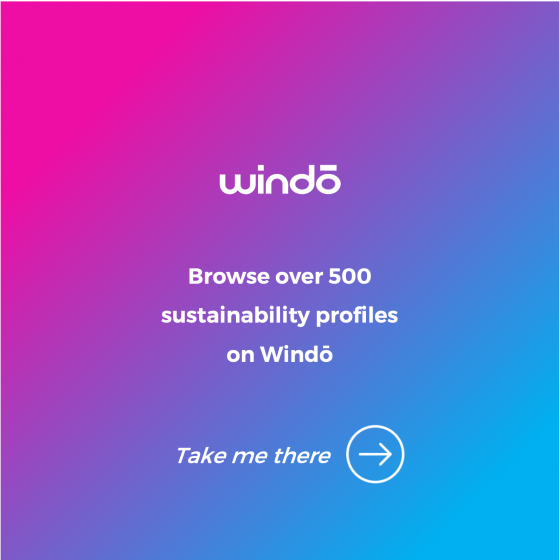Analysis of the 63 Fortune 100 and FTSE 100 companies sharing Black workforce data since 2020 reveals that 18% have seen increases of less than 5%, 13% have made no progress, and 16% have experienced a decline.
However, 18 companies, including Microsoft, BlackRock, and Google, have achieved significant improvements in Black representation.
From Turning Point to Political Turmoil: Corporate DEI in 2020 vs 2024
The murder of George Floyd (May 25th 2020) ignited unprecedented protests and social unrest, shaking the foundations of Corporate America and beyond. Organizations that had long overlooked or denied the existence of systemic racism and racial inequity within their ranks were forced to confront uncomfortable truths. In response, many pledged to diversify their teams – from entry-level positions to senior executives – and embed deeper DEI commitments into their corporate cultures.
Four years on, the corporate DEI landscape is more convoluted than ever. The term DEI is increasingly weaponized by politicians and leaders during significant elections across the globe, including in the US and UK. The attack on DEI, which propelled the resignation of Harvard’s President Claudine Gay and the suing of VCs for investing in Black entrepreneurs, has left business leaders stuck between a rock and a hard place.
What changed? 2020 seemingly marked a turning point for corporate attitudes towards racial representation, and the Black Lives Matter movement at large. Pledges were made by a majority of leading US companies; 1,100 organizations committed a total of $200 billion to racial justice initiatives. However, momentum was soon quelled. In 2023, for example, the US Supreme Court overturned affirmative actions in college admissions, marking a significant legal shift. A group of Republican Attorneys General issued a cautionary letter to Fortune 100 company CEOs, cautioning them against race-based preferences. This was countered by the Democratic Attorneys General, who emphasized the vitality of corporate diversity programs and urged CEOs to reinforce commitments.
With their analysis of race-related diversity targets, Windō is shining a light on where progress has been made, which organizations have stuck to their promises, and the impact that DEI’s controversy is having on large corporations.
Key Findings from Windō’s Analysis: Progress Makers Who Are Getting it Right
Bain & Company, BlackRock, Cisco, Gilead, Google, Microsoft and Salesforce have increased their Black workforce representation by between 33% and 75% since 2020.
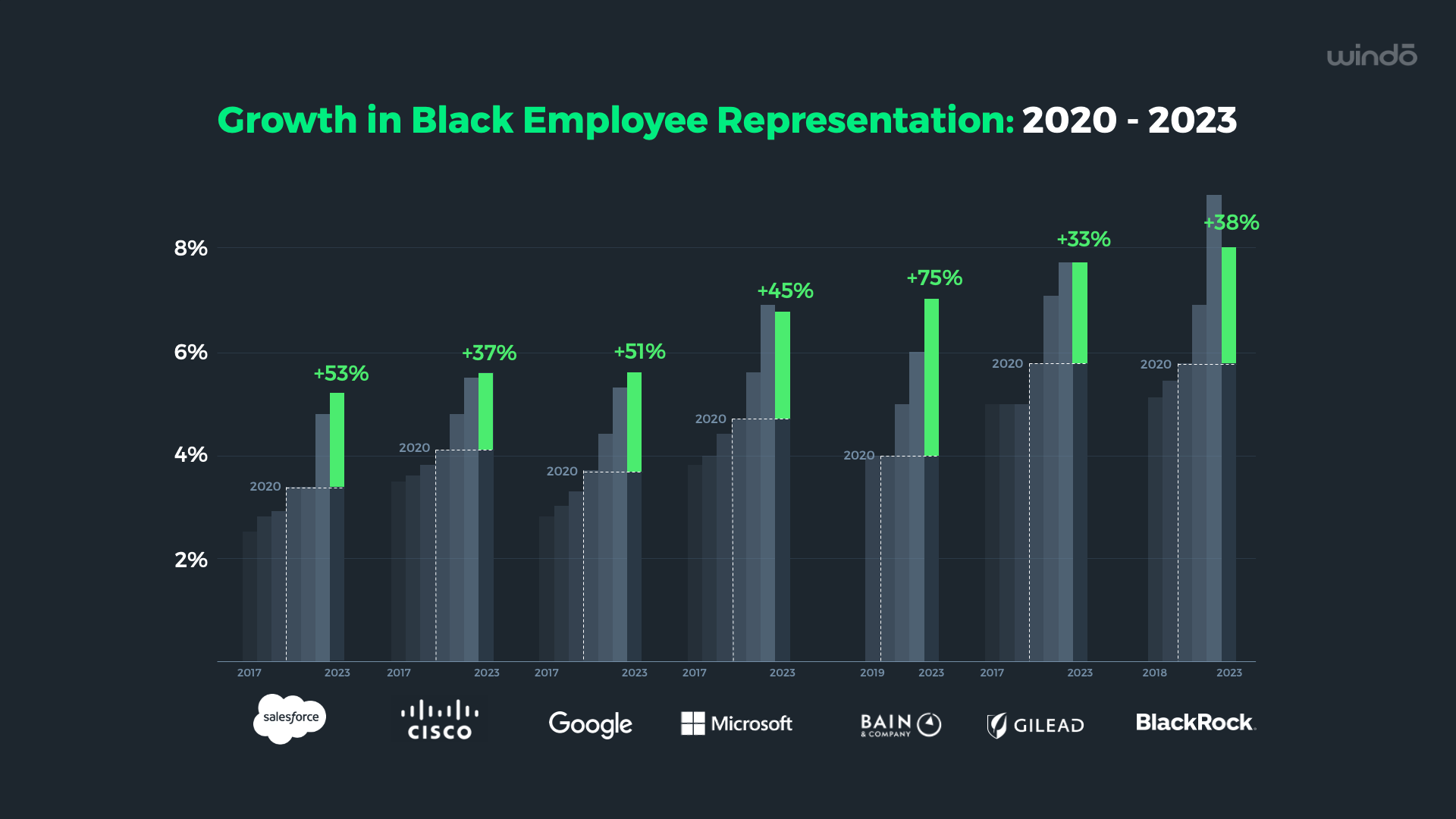
In addition, five companies stand out for increasing their number of People of Color Executives in the US. Bank of America, Microsoft, Disney, Nike, and Pfizer have increased their numbers by between 23% and 38% since 2020.
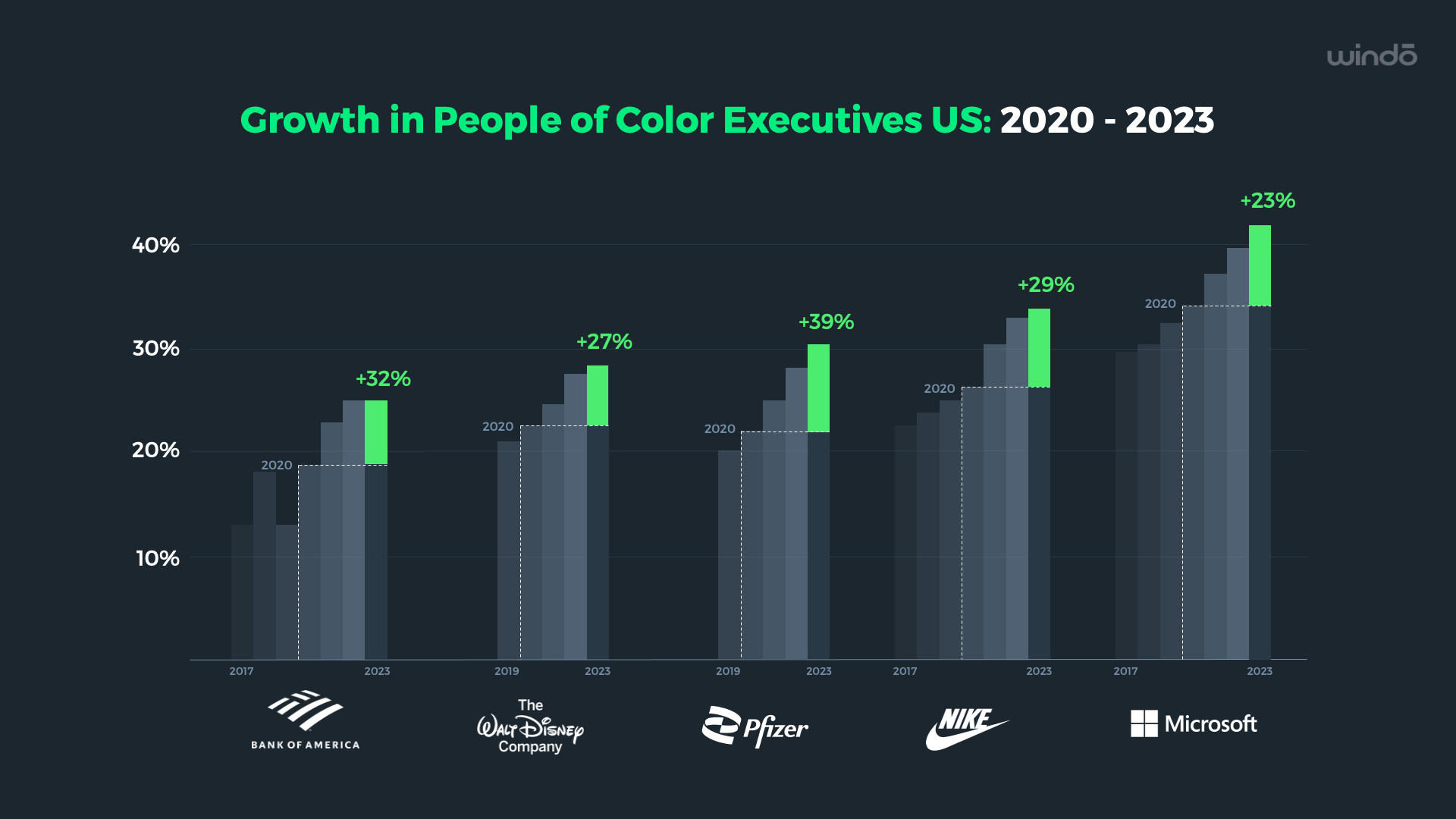
The impact of George Floyd’s murder was not limited to the US. Many companies in the UK made similar commitments. Four companies, Clifford Chance, Deloitte, HSBC, and Standard Chartered have significantly increased their number of Black senior leaders in the UK, with increases ranging between 92% and 100% over the last four years.
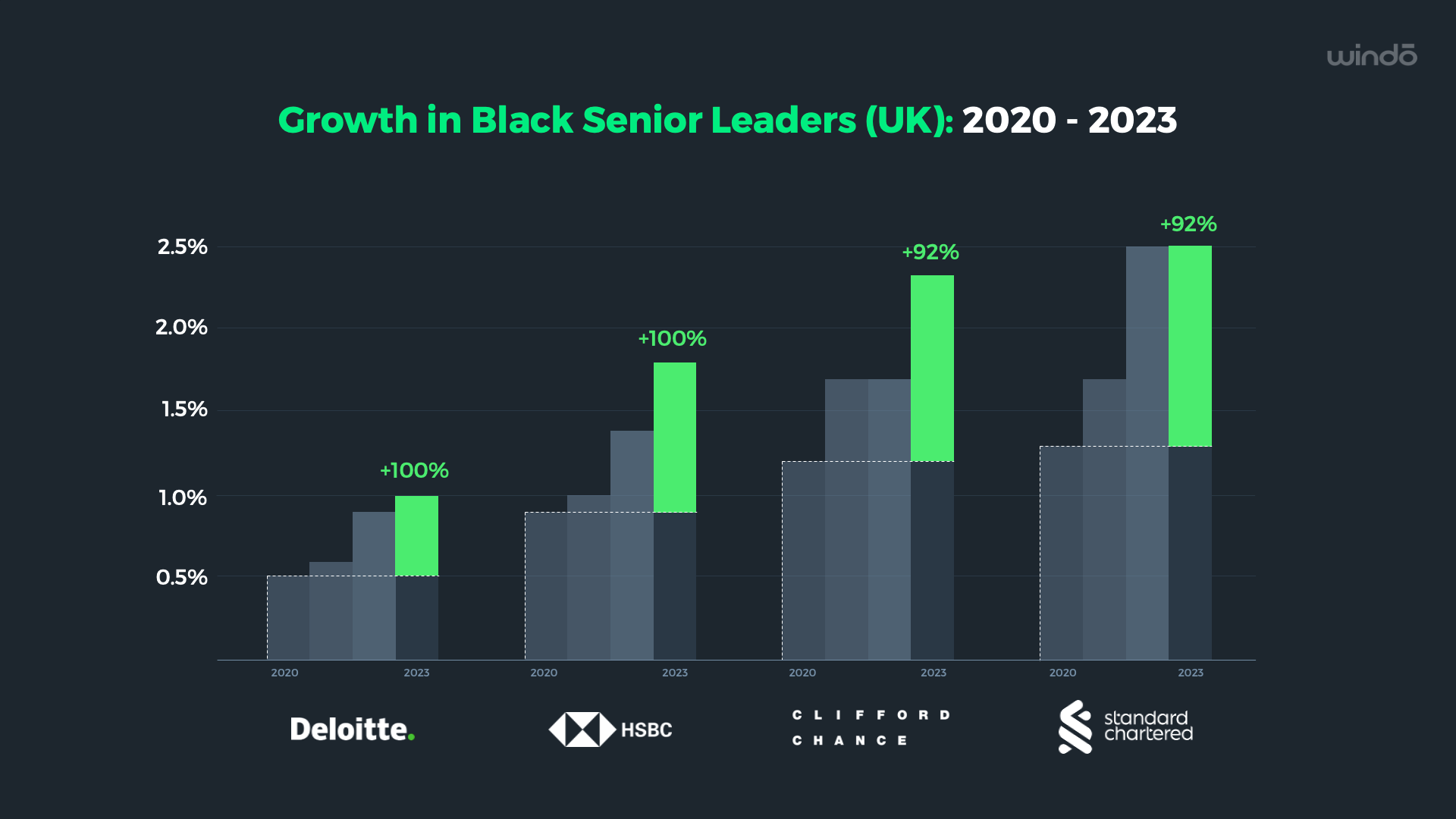
Companies sticking with Race Related DEI Targets
Windō found that the following nine leading companies are continuing to publish, and make significant progress towards, their targets for increasing representation of Black individuals and People of Color:
- Cisco exceeded its 2023 target of a minimal 25% increase in representation of all employees who self-identify as African American/Black (from entry level through to manager), having achieved a 73% increase.
- Google achieved its 2023 target of doubling Black representation in the US (upping its representation from 8% in 2017 to 5.6% in 2022).
- Salesforce set a target in 2020 to double its Black leadership in the US (which at the time stood at 5%) by 2024. The company exceeded this target a year ahead of schedule, achieving 3.7% Black leadership in 2023.
- Nike has exceeded its 2025 target to achieve 30% US Racial and Ethnic Minority representation at Director Level and above two years early. As of 2023, the representation level stood at 34%, up from 26% in 2020.
- IBM set a target in 2020 to allocate 15% of its total supplier spend to Black-owned suppliers by 2025. It has made significant progress; in 2023 its percentage of Black-owned suppliers stood at 5%, up from 6.9% in 2022.
- Starbucks is on track to achieving its target of 30% People of Color at all enterprise roles by 2025, having achieved this for ⅘ roles as of 2023.
- Pfizer is making progress towards its goal of 32% Ethnic Minority representation at the Vice President (VP) level and above by 2025. As of 2022, this stood at1%, and increased to 30.5% in 2023.
- HSBC set a target in 2020 to at least double the number of Black colleagues in senior leadership in the UK by 2025. It achieved that target two years early in 2023
- Companies are still setting new targets – Bristol Myers Squibb recently set a target to increase Black/African American executives in the US to 10% by 2025.
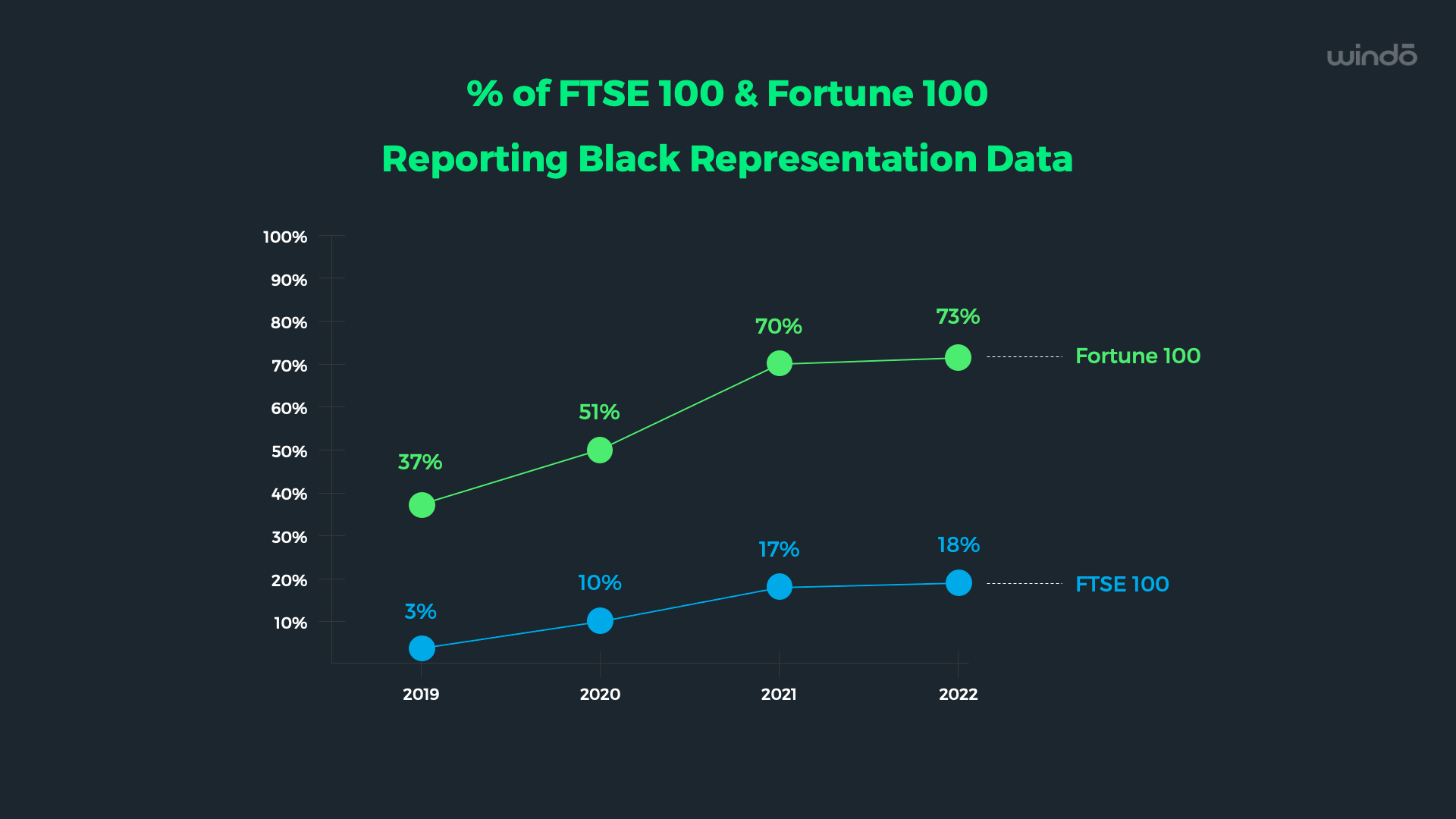
The number of companies sharing Black Representation Data in the FTSE 100 and Fortune 100 is on the rise however following a spike in 2021 it has slowed down.
Ken Janssens, Co-Founder and Head of Social Impact at Windō comments:
“The repercussions of the Black Lives Matter (BLM) movement in 2020 can’t be underestimated. Organisations were forced to confront systemic racism and inequity within their ranks. Four years on, the path to diversity, equity and inclusion in workplaces remains challenging. Amid legal uncertainties and political tensions, companies face a dual battle: implementing meaningful DEI initiatives while navigating backlash.”
“Despite these challenges, our data showcases a beacon of hope. Leading companies like HSBC, Microsoft, and Google persist in their commitments to diversity and inclusion, making tangible strides towards racial justice. From increased Black workforce representation to the elevation of People of Color executives, these companies are not just making promises around issues that the events of 2020 brought to light; they are delivering on them.
“It’s hard to tell what the future holds for DEI, but the numbers don’t lie: there are leading companies out there who remain steadfast in their commitment to ensuring their workforces reflect the diverse customers and communities they serve.”
Methodology
this report is based on the 500 largest listed and private companies across the U.S., UK, France and Germany and an analysis of their sustainability, DEI and annual reports from 2017 to 2023.
Sources
1,100 organizations committed a total of $200 billion to racial justice initiatives
The US Supreme Court overturned affirmative actions in college admissions
A group of Republican Attorneys General issued a cautionary letter to Fortune 100 company CEOs
Cisco exceeded its 2023 target
Google achieved its 2023 target
Salesforce set a target in 2020 to double its Black leadership in the US (which at the time stood at 1.5%) by 2024.
Nike has exceeded its 2025 target to achieve 30% US Racial and Ethnic Minority representation at Director Level and above two years early.
IBM set a target in 2020 to allocate 15% of its total supplier spend to Black-owned suppliers by 2025.
Starbucks is on track to achieving its target of 30% People of Color at all enterprise roles by 2025.
Pfizer is making progress towards its goal of 32% Ethnic Minority representation at the Vice President (VP) level and above by 2025.
HSBC set a target in 2020 to at least double the number of Black colleagues in senior leadership in the UK by 2025.
Bristol Myers Squibb recently set a target to increase Black/African American executives in the US to 10% by 2025.


